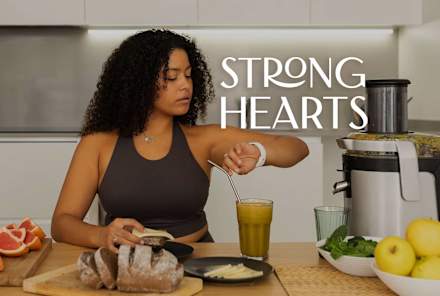Advertisement
Your Complete Guide To Postpartum Nutrition: Healing Foods & More

The time after birth should be observed as a sacred bonding time between mom and baby—and a time for deep care and rest for the new mother, given you just spent the last nine to 10 months growing a human being. One of those ways is by having a solid postpartum nutrition plan in place to nourish yourself back to health. And you can start by eating nutrient-dense foods to support your body after giving birth, which is one of the most profoundly useful things you can do in the first six months postpartum (and beyond).
So, here, we'll be diving into why it's so important to care for your body post-pregnancy, the five pillars of postpartum nutrition, why you should focus on anti-inflammatory foods and other important nutrients, and finally, a full checklist of foods you can try.
Why postpartum nutrition is so important:
When considering postpartum recovery and optimal nutrition, it's important to keep a few things in mind. The first is that you've just spent nine months growing a human, and you're physically recovering from labor. It's also important to remember that lactation also places high demands on the body, and decreased micronutrient stores can heighten postpartum depression risk.
An alarmingly growing body of new research has linked depression to inflammation1. We also now better understand the role of the gut-brain connection (via the vagus nerve) in regulating mood, and a 2013 study published in the Asian Journal of Psychiatry found a strong correlation between inflammation, serotonin levels, and postpartum depression.
Further, the research on the link between nutrient depletion during pregnancy and lactation and postpartum depression has shown that nutrient depletion can affect the production of key mood-regulating neurotransmitters2, like serotonin, and that lower levels of folate, vitamin D, iron, selenium, zinc, fats, and fatty acids have all been associated with a higher risk of PPD.
Clearly, proper postpartum nutrition is vital for both physical and mental health.
The five sacred principles of postpartum nutrition:
Put simply, eating in a way that nourishes your body has never been more important.
Eat warm, digestible foods.
Soups and stews make a great foundation for convenient postpartum meals.
Hydrate often.
For breastfeeding mothers, 10 to 15 glasses of water a day are required to quench thirst and produce enough breast milk. Plus, the more fluids you consume, the faster your body can rebuild and regenerate.
Eat a nutrient-dense, anti-inflammatory diet.
Think colorful produce, healthy proteins, fats, and certain grains.
Eat collagen-rich foods to support tissue repair.
Collagen is a superfood for rebuilding tissues, and many new moms swear by it for helping with postpartum hair loss. You can find hydrolyzed collagen supplements or powders in your natural foods store or online.
Take the appropriate supplements.
Every new mother should continue taking high-quality prenatal vitamins while breastfeeding and possibly other supplements discussed in the following sections. Whenever possible, choose high-quality, food-based supplements recommended by your doctor or health care professional.
Anti-inflammatory foods: The cornerstone of healthy postpartum recovery.
Anti-inflammatory, nutrient-rich foods help inhibit the release of pro-inflammatory cytokines―molecules that regulate inflammation levels. Since your goals are to heal your body, rebuild your tissues, protect your mental health (inflammation is indicated in PPD3), produce nutrient-rich breast milk (for those who breastfeed), and restore your nutrient levels, anti-inflammatory foods should be the cornerstone of your diet.
Consider adding these anti-inflammatory foods to your diet:
- A wide variety of fresh, colorful vegetables (especially leafy greens)
- Fruits and berries
- Iron-rich proteins like grass-fed beef, buffalo, lamb, bison, liver, and bone broths
- Healthy fats like coconut oil, avocado oil, extra-virgin olive oil, and pasture-raised butter
- Fatty, low-mercury fish like wild-caught salmon and sardines
- Moderate amounts of gluten-free, nutrient-rich grains like rice, millet, quinoa, oats, etc.
- Probiotic-rich foods like yogurt, kefir, kimchi, kombucha, and sauerkraut help maintain a healthy gut, which helps quell inflammation throughout your body while improving digestion
Additional healing foods to support postpartum recovery.
- Collagen, which can be found in bone broths, gelatin, and meat cooked with bones. The best supplement source of collagen is in grass-fed hydrolyzed collagen powder.
- Protein, which is best found in meats, fish, eggs, nuts, beans, legumes, and seeds. You should aim for 21 grams of protein in your postpartum days.
- Essential fatty acids, which can be found in walnuts, chia seeds, wild Alaskan salmon, albacore tuna, flaxseeds, hemp seeds, and sardines. If you're going the supplement route, opt for fish oil, krill oil, cod liver oil, flaxseed oil, algae oils.
- Vitamin A, which can be found in beef liver, carrots, sweet potato, kale, and spinach. The best supplement sources include cod liver oil and pharmaceutical-grade vitamin A supplements.
- Vitamin C, which can be found in guava, papaya, kiwi, oranges, strawberries, pineapple, bell peppers, broccoli, red cabbage, Brussels sprouts, kohlrabi, snow peas. If you're going the supplement route, opt for pharmaceutical-grade vitamin C supplements.
- Vitamin D, which is best absorbed through sunshine and pharmaceutical-grade vitamin D3/K2 supplements.
- B vitamins, which can be found in nutritional yeast, sea vegetables, macadamia nuts, almonds, pistachios, black and pinto beans, lentils, liver, turkey breast, pastured eggs, avocado, yogurt, kefir. The best supplement sources are high-quality pharmaceutical-grade B-complex.
- Vitamin B12, best found in beef liver, sardines, lamb, wild-caught Alaskan salmon, and nutritional yeast. If you're going the supplement route, opt for a high-quality sublingual methyl-B12 lozenge.
- Iron, which is best found in red meat like beef, bison, liver, and lamb; dark leafy greens like kale, collards, and spinach; lentils; black beans; and dark chocolate. If you'd rather go the supplement route, look for pharmaceutical-grade iron with vitamin C. Work with your health care provider as supplemental iron can sometimes cause digestive issues and constipation―not what you want postpartum.
- Folate, best found in spinach, leafy greens, beef liver, black-eyed peas, broccoli, and avocado. Supplement sources include pharmaceutical-grade methyl-folate.
- Zinc, which is best found in pumpkin seeds, lamb, chickpeas, cocoa powder (yes!), and grass-fed beef. If you're going the supplement route, opt for pharmaceutical-grade zinc glycinate.
- Iodine, which is found in sea vegetables like dulse and nori, baked cod, cranberries, potatoes, shrimp. Supplement sources include food-based iodine supplements like kelp capsules.
- Selenium, which is found in food sources like eggs, sunflower seeds, albacore tuna, chia seeds. If you're going the supplement route, pharmaceutical-grade multivitamin supplements typically contain enough selenium for postpartum recovery.
- Magnesium, which is best found in supplement for postpartum. Most women will benefit from additional supplementation postpartum. Check with your doctor or health care professional about the right amount for you, but it's typically best to look for magnesium glycinate―a highly absorbable form of magnesium that's gentle on your stomach.
If you're feeling overwhelmed by the sheer number of nutrients and foods listed in the previous section, don't be. Remember, if you keep a variety of those anti-inflammatory and healing foods as the cornerstone of your diet, you'll naturally receive nutrients in every meal.
Your ultimate grocery checklist:
To make things simpler for you, here are my favorite inflammation-fighting, nutrient-dense foods for your snacks and meals. Bookmark this one and keep it for your next trip to the grocery store.
Vegetables:
- Avocado
- Bell peppers
- Broccoli
- Brussels sprouts
- Carrots
- Leafy greens like spinach, Swiss chard, and kale
- Potatoes
- Red and green cabbage
- Snow peas
- Sweet potato
Fruits:
- Bananas
- Berries
- Citrus fruits
- Cranberries
- Guava
- Kiwi
- Papaya
- Pineapple
Proteins:
- Albacore tuna
- Beef
- Beef liver
- Black beans
- Black-eyed peas
- Chicken on the bone
- Chickpeas
- Cod
- Collagen
- Eggs
- Lamb
- Lentils
- Mackerel
- Sardines
- Shrimp
- Turkey breast
- Wild-caught Alaskan salmon
Healthy fats:
- Avocados/avocado oil
- Coconut oil
- Extra-virgin olive oil
- Pastured butter
Nuts and seeds:
- Almonds
- Brazil nuts
- Chia seeds
- Flaxseeds
- Macadamia nuts
- Pistachios
- Pumpkin seeds
- Sunflower seeds
- Walnuts
Miscellaneous healing foods:
- Bone broth
- Cocoa
- Cultured foods such as yogurt, kefir, kimchi, sauerkraut
- Dark chocolate
- Gelatin
- Hydrolyzed collagen
- Sea vegetables
- Spirulina
- Herbs and spices
The bottom line:
While caring for a new baby is a challenge no matter what, it is my firm belief that postpartum recovery can be easily conquered as long as you stay hydrated and eat a nutrient-dense, anti-inflammatory diet throughout postpartum recovery and breastfeeding; you'll be putting yourself on the fast track to recovery so you can be the happy, energized mom you want to be.
Keep in mind that you don't need to eat all of these foods every week to get enough nutrients. Variety and awareness are key! If you want to go deeper, work with a functional medicine doctor six weeks postpartum to check in-depth labs and look for micronutrient deficiencies.











